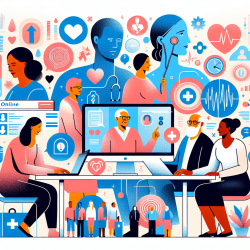Enhancing Online Therapy Skills: Insights from Big Data Research

Online therapy is an evolving field that benefits significantly from ongoing research. One notable study, "Bridging Big Data: Procedures for Combining Non-equivalent Cognitive Measures from the ENIGMA Consortium," offers insights that can help practitioners enhance their skills and service delivery. Here’s how you can implement the outcomes of this research to improve your practice.
Understanding the Research
The ENIGMA Consortium's study focuses on harmonizing cognitive measures from different sources to ensure consistency and reliability. This is particularly important in online therapy, where practitioners often use varied assessment tools. The study demonstrates how data harmonization can improve the comparability of cognitive measures, specifically verbal learning tests like the California Verbal Learning Test (CVLT), the Rey Auditory Verbal Learning Test (RAVLT), and the Hopkins Verbal Learning Test-Revised (HVLT).
Implementing Harmonization Techniques
Here are some practical steps to implement the research findings into your online therapy practice:
- Adopt Standardized Assessment Tools: Choose cognitive measures that have been harmonized across different studies. This ensures that the assessments you use are reliable and comparable.
- Use Conversion Tools: The study provides free conversion tools that allow you to translate scores from one cognitive measure to another. This can be particularly useful when you need to compare results from different tests.
- Adjust for Covariates: Take into account factors like age, gender, and education level when interpreting cognitive measures. The research shows that these covariates significantly impact test scores.
Encouraging Further Research
The study underscores the importance of data sharing and harmonization in advancing cognitive and behavioral sciences. As an online therapy practitioner, you can contribute to this effort by:
- Participating in Data Sharing Initiatives: Join consortia like ENIGMA to contribute your data and benefit from large-scale analyses.
- Conducting Your Own Research: Use the harmonization techniques outlined in the study to conduct your own research and share your findings with the broader community.
- Staying Updated: Keep abreast of the latest research in cognitive measures and data harmonization to continually improve your practice.
Conclusion
The findings from the ENIGMA Consortium study offer valuable insights for online therapy practitioners. By adopting standardized assessment tools, using conversion tools, and adjusting for covariates, you can improve the reliability and comparability of your cognitive assessments. Additionally, participating in data sharing initiatives and conducting your own research can further advance the field.To read the original research paper, please follow this link:
Bridging Big Data: Procedures for Combining Non-equivalent Cognitive Measures from the ENIGMA Consortium.
Citation: Kennedy, E., Vadlamani, S., Lindsey, H. M., Lei, P.-W., Jo-Pugh, M., Adamson, M., ... & Wilde, E. A. (2023). Bridging Big Data: Procedures for Combining Non-equivalent Cognitive Measures from the ENIGMA Consortium. Cold Spring Harbor Laboratory. https://www.ncbi.nlm.nih.gov/pmc/articles/PMC9882238/?report=classic










